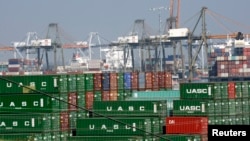Faltering international trade may slow global economic growth, according to Monday's report from the Organization for Economic Cooperation and Development. The OECD says global expansion will slow 0.1 to 2.9 percent this year.
OECD Chief Economist Catherine Mann called the further sharp downturn in trade and emerging market economies "deeply concerning." She noted these levels of trade have previously been associated with global recession.
The OECD is a leading global policy organization, which also predicted slightly faster growth next year.
The report attributed some of the slowdown in trade to changes in the worlds second-biggest economy. China has seen imports slow as it evolves from an export-driven manufacturing economy to one more focused on domestic demand and services.
Slowing demand for raw materials in China has hurt commodity prices in the many emerging economies that depend on this huge market.
The OECD says the U.S. economy will remain "solid" growing at 2.4 percent this year and a little faster next year. The authors say the strong dollar hurts U.S. growth by making exports more expensive to foreign buyers, but predict that drag will be outweighed by rising private investment. The OECD also suggested that U.S. central bank proceed with a slight increase in interest rates that has been under discussion for some time.
We will learn more about the world's largest economy later this week when U.S. Federal Reserve Chair Janet Yellen and other top Fed officials give public speeches, and experts publish data on the health of the U.S. job market, inflation, retail sales, and consumer confidence.





